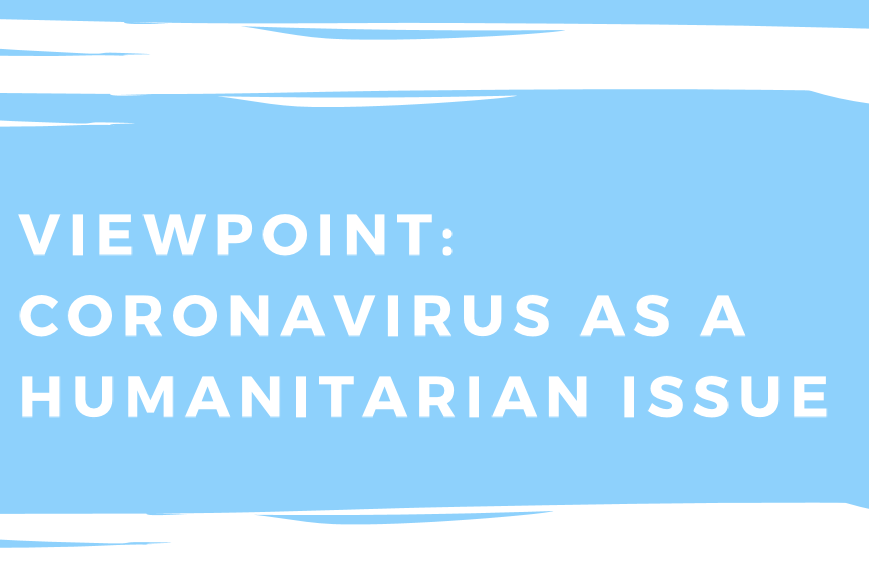In Viewpoint posts, Novel Hand editors and contributors take a stance on a humanitarian topic. While all NH posts are founded in research and facts, Viewpoint posts allow our writers to express their opinions in areas that they are knowledgeable in.
In the past month, the coronavirus (COVID-19) has been at the top of the headlines. Since January, the coronavirus has spread from China to Europe, with cases now confirmed on every continent but Antarctica. There have been several deaths in the US from coronavirus. The New York Times now sends out a daily coronavirus newsletter.
As the disease has spread over the past several weeks, I’ve been paying attention to the global response to the disease and its representation in media. Below are some of my thoughts.

Is coronavirus a humanitarian issue?
It seems obvious that the coronavirus is a humanitarian issue, because it affects the health of a large group of people. But the response to the virus has been largely economic and fearful. News reports on the virus largely focus on its spread and its impact on financial markets and supply chains. Although the virus started in China in December of 2019 and the overwhelming number of deaths have occurred in mainland China, I’ve only seen one plea for prayers for China- and it was from a Chinese international student at Vanderbilt on Facebook.
Furthermore, the virus has been racialized. It was first called the ‘Wuhan virus’ because the virus originated in Wuhan, Hubei province in China. This commonly happens with a new disease. Take the swine flu, for example– it was originally called the ‘Mexican swine flu’. With coronavirus, fear of the disease has led to racism and the racialization of the disease.
Yes, coronavirus is a humanitarian issue, because it affects the well-being of many people. But the global response has not treated it as one.
Coronavirus as a crisis
The most striking feature of the coverage of the coronavirus has been its consistency. In the American media, the only other topic with comparable salience in 2020 is the Democratic primaries and caucuses. Day in and day out, there are updates of the numbers who have died from the virus and its spread across the globe, although the threat to much of the US remains minimal.
Compare the coverage of the coronavirus to that of the Australian bushfires. We covered this story in January. When these fires ravaged millions of acres of land in early January, stories showed up all over social media and the news. But although the fires had an economic impact in the billions of dollars, they slipped from the headlines in a matter of days.
Coronavirus is a major disaster which affects human livelihood similarly to the Australian bushfires, and will also have a major economic impact. The major difference is that the coronavirus has stayed in the headlines.
I think that the staying power of the coronavirus in American media can be attributed to the fear that it causes, and our response to that fear. While the Australian bushfires are non-transferable phenomena happening on the other side of the globe, the coronavirus is a transferable phenomenon on the other side of the globe. The American public was momentarily sympathetic to Australia, but soon forgot about its crisis. However, the coronavirus has stuck in the headlines because it presents an imminent threat to America and our way of life.
The coverage of these two crises demonstrates a degree of selfishness inherent to our attention to crises. Namely, our attention to crises hinges on our closeness to the disaster. Reports of dying koala bears and millions of acres of burnt wildlife were jarring for a few days. But our distance from the issue allowed us to forget about it once it was no longer new. However, the threat of the spread of coronavirus throughout the world and in America has held our attention for weeks and weeks.
While our increased alarm about a crisis that can affect us is understandable, it also shines a light on the limits of our sympathy. In thinking about the coronavirus and other humanitarian crises, we should be careful to not let a crisis slip from our attention just because it doesn’t directly affect us.
How you can help
The Center for Disaster Philanthropy outlines critical needs in response to the coronavirus. Supporting organizations that work in areas with poor access to medical services is key. The CDP also recommends finding ways to support quarantined individuals.
- College Football, Ariana Grande, and Water - September 3, 2023
- Livestock and Land Use: How Are We Feeding The Planet? Impactfull April 2022 - April 19, 2022
- What Does Voluntourism Look Like? A Case Study in a Cambodian Orphanage - March 28, 2022

Pingback: Five things to do at home this week - Novel Hand